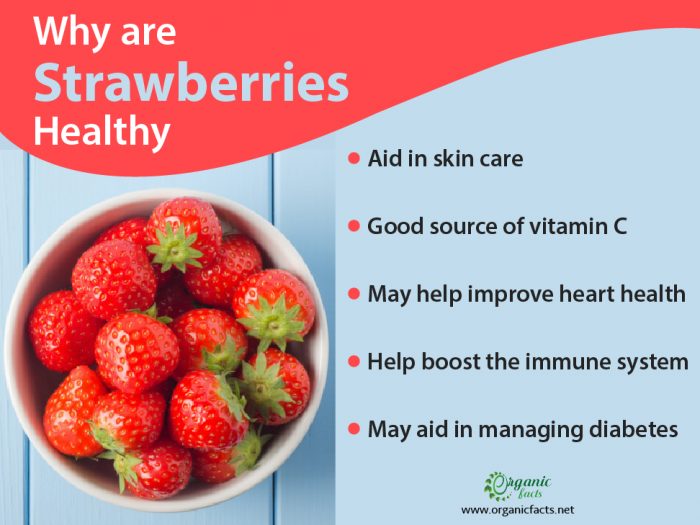Strawberries, with their vibrant hue and sweet taste, have long been a favorite for many. But beyond their delightful flavor, these heart-shaped fruits pack a punch when it comes to health benefits. From boosting brain function to aiding in skin care, strawberries offer a myriad of advantages for those who indulge in them. However, like all things, it’s essential to consume them in moderation and be aware of potential side effects. Whether you’re looking to improve your heart health, enhance your skin’s glow, or simply enjoy a tasty treat, strawberries might just be the perfect addition to your diet. Dive into this comprehensive guide to discover all the wonders these little red gems have to offer.
What is Strawberry?
A strawberry (Fragaria) is a sweet, red heart-shaped fruit, which is much-loved for its delicious taste and for its nutritional benefits. Native to many parts of the world, it belongs to the rose family and has a distinct aroma. Despite its name, a strawberry is not a berry from a botanical standpoint. It is an aggregate accessory fruit, which means that the fleshy part is not derived from the plant ovaries. Instead, each visible seed covering its outside is borne from one of the ovaries of the flower. The strawberry leaves are also eaten raw cooked and cooked. One can also take it as an antioxidant-rich strawberry tea. [1]
Strawberries are seasonal fruits that grow in bushes. There are three types of strawberries:
- June-bearing strawberries
- Everbearing strawberries
- Day-neutral strawberry variety
Serving Size : Nutrient Value Water [g] 90.95 Energy 32 Energy [kJ] 136 Protein [g] 0.67 Total lipid (fat) [g] 0.3 Ash [g] 0.4 Carbohydrate, by difference [g] 7.68 Fiber, total dietary [g] 2 Sugars, total including NLEA [g] 4.89 Sucrose [g] 0.47 Glucose (dextrose) [g] 1.99 Fructose [g] 2.44 Starch [g] 0.04 Calcium, Ca [mg] 16 Iron, Fe [mg] 0.41 Magnesium, Mg [mg] 13 Phosphorus, P [mg] 24 Potassium, K [mg] 153 Sodium, Na [mg] 1 Zinc, Zn [mg] 0.14 Copper, Cu [mg] 0.05 Manganese, Mn [mg] 0.39 Selenium, Se [µg] 0.4 Fluoride, F [µg] 4.4 Vitamin C, total ascorbic acid [mg] 58.8 Thiamin [mg] 0.02 Riboflavin [mg] 0.02 Niacin [mg] 0.39 Pantothenic acid [mg] 0.13 Vitamin B-6 [mg] 0.05 Folate, total [µg] 24 Folate, food [µg] 24 Folate, DFE [µg] 24 Choline, total [mg] 5.7 Betaine [mg] 0.2 Vitamin A, RAE [µg] 1 Carotene, beta [µg] 7 Vitamin A, IU [IU] 12 Lutein + zeaxanthin [µg] 26 Vitamin E (alpha-tocopherol) [mg] 0.29 Tocopherol, beta [mg] 0.01 Tocopherol, gamma [mg] 0.08 Tocopherol, delta [mg] 0.01 Tocotrienol, alpha [mg] 0.01 Vitamin K (phylloquinone) [µg] 2.2 Fatty acids, total saturated [g] 0.02 16:0 [g] 0.01 18:0 [g] 0 Fatty acids, total monounsaturated [g] 0.04 16:1 [g] 0 18:1 [g] 0.04 Fatty acids, total polyunsaturated [g] 0.16 18:2 [g] 0.09 18:3 [g] 0.07 Phytosterols [mg] 12 Tryptophan [g] 0.01 Threonine [g] 0.02 Isoleucine [g] 0.02 Leucine [g] 0.03 Lysine [g] 0.03 Methionine [g] 0 Cystine [g] 0.01 Phenylalanine [g] 0.02 Tyrosine [g] 0.02 Valine [g] 0.02 Arginine [g] 0.03 Histidine [g] 0.01 Alanine [g] 0.03 Aspartic acid [g] 0.15 Glutamic acid [g] 0.1 Glycine [g] 0.03 Proline [g] 0.02 Serine [g] 0.03 Sources include : USDA [2]
Strawberry Nutrition
Strawberries are packed with vitamins and minerals such as vitamins C and K, folate, potassium, manganese, and magnesium. They are low-calorie, fiber-rich, and abundant in antioxidants and polyphenols. According to the USDA, one cup of strawberries provides 3 g of fiber and 12 g of carbohydrates. [3]
Calories in a Strawberry
According to the USDA, a 100 g serving of raw strawberries contains about 32 calories. This makes them a low-calorie food. You can eat these without worrying about any unhealthy weight gain. [4]
Health Benefits of Strawberry
Let’s look at the most popular health benefits of strawberries in detail below.
May Improve Heart Function
Strawberries are not just delicious; they’re also packed with heart-healthy antioxidants. Rich in ellagic acid and flavonoids like anthocyanin, catechin, quercetin, and kaempferol, these berries can potentially reduce the risk of cardiovascular diseases by preventing the buildup of LDL (bad) cholesterol. [5]
A study even suggests that regular strawberry consumption can shield against certain inflammatory and fibrinolytic factors in individuals at risk. [6]
Another study highlighted that berries might enhance HDL (good) cholesterol, blood pressure, and blood platelet function in those with heart risk factors. [7]

Yummy strawberry popsicles on a bed of strawberries. Photo Credit: Shutterstock
May Boost Brain Function
Strawberries aren’t just a treat for the taste buds; they’re also a boon for the brain. Rich in iodine, vitamin C, and phytochemicals, these berries support the nervous system’s optimal function.
A Harvard study found that higher flavonoid consumption, especially from strawberries and blueberries, was linked to reduced cognitive decline in older individuals. [8]
Recently, a study presented at the American Society of Nutrition’s Nutrition 2023 conference, funded by the California Strawberry Commission, delved deeper. Involving around 35 healthy older adults, participants consumed a daily dose of freeze-dried strawberry powder equivalent to two cups of fresh strawberries. After eight weeks, researchers observed positive changes in cognition markers, blood pressure, and waist circumference. [9]
May Aid in Skin Care
A 2017 Italian research found that cosmetics formulated with strawberries can shield our skin from UV damage, suggesting that regular strawberry masks can leave the skin feeling rejuvenated and pollutant-free. [10]
Their rich antioxidant properties make strawberries a potential defense against free radical-induced skin damage. [11]
Moreover, a 2019 study highlighted the anti-aging benefits of microneedle treatments using a vitamin C serum infused with strawberries. Participants noticed enhanced skin hydration and elasticity. [12]
How to use: To make an easy face mask for glowing skin, crush 4-5 strawberries and mix the pulp with a tablespoon of honey. Apply on the face, leave it until dry, and wash off. Strawberry moisturizing lip balms also help keep lips hydrated.

Strawberries are seasonal fruits that grow in bushes.
May Aid in Managing Diabetes
Strawberries might be a sweet ally against type 2 diabetes. Their low glycemic index can potentially reduce the risk of developing this condition, as highlighted in the British Medical Journal. [13]
Research funded by The Canadian Institutes of Health Research found strawberries to enhance glycemic control in diabetic individuals. [14]
A 2020 review further supports the idea that strawberries, either solo or paired with other foods, can positively influence glycemic profiles. Additionally, they’ve been linked to managing hyperglycemia-associated type 2 diabetes. [15] [16]
May Provide Relief from Arthritis & Gout
Strawberries might aid you against arthritis and gout pain. The Arthritis Foundation praises these red gems for their rich content of antioxidants and detoxifiers. [17]
These components not only alleviate gout and arthritis pain but also combat symptoms like muscle and tissue degeneration, drying of joint fluids, and the buildup of harmful substances, including uric acid.
A 2017 research study shows that strawberries have possibly analgesic and anti-inflammatory properties and may help fight osteoarthritis. This US study was conducted on obese adults with evidence of knee osteoarthritis. [18]
May Help Prevent Constipation
Due to their fiber content, strawberries help boost digestion and prevent constipation. They can be particularly good for children. Stanford Children Health recommends strawberries for constipation in children because of their moderate fiber content. Further research on adult humans is required to validate this claim. [19]
Other Health Benefits
Strawberries are also useful in some other ways:
May Aid in Improving Hair Health: The rich variety of antioxidants, ellagic acid, and vitamins help battle hair loss, moisturize the hair, and prevent dandruff. For glossy hair, mix 5-6 crushed strawberries with 1 tablespoon of yogurt. Massage this into damp hair and rinse off after 10-15 minutes. Shampoo as usual. This works as a natural hair conditioner.
Can Act As Teeth Whitener: Strawberries contain malic acid which acts as a natural teeth whitening agent. Strawberry sugar-free gum is also a popular option. Mix the crushed fruit with baking soda until blended and put it on your teeth. Leave it on for 5 minutes and lightly use a toothbrush to whiten the teeth.
Reduce Puffy Eyes: Strawberries help reduce the appearance of puffy eyes. For a quick fix, place slices of the fruit on your eyelids and relax for ten minutes.
How to Select and Store?
Nothing beats fresh strawberries plucked from the bush and eaten raw! Here’s how to choose the best ones:
- Select organic, locally grown strawberries, as they are safe to eat and have a sweet flavor.
- When you choose strawberries, look for the ones that are red and fragrant.
- The imported variety is available all year round.
- They are highly perishable and should be eaten in a couple of days.
- You can refrigerate them for a week, or freeze them for up to six months.
- You can also buy freeze-dried strawberries and use them in smoothies.
Note: Strawberries have the highest level of pesticides, according to the USDA, so buy the fruits wisely (organic and locally grown is best!)
Ways To Include Strawberries In Your Diet
Strawberries are often eaten raw or added to fruit salads and custards. You can also easily consume strawberry juice, which can be prepared at home.
Strawberry extract is also extensively used in processed food items, including ice creams, jams, jellies, squashes, syrups, candies, and chocolates.
Due to its extraordinarily rich flavor, taste, and color, the fruit essence is used in tablets, medicines, protein bars, protein shakes, and supplements. The fragrant fruit is rich in antioxidants and is a popular flavoring in lotions, face washes, children’s toothpaste, body oils, and shampoos.
You can include strawberries in your diet in many ways. Here are some of our suggestions:
- In a No-Bake Strawberry Cream Pie Recipe
- Use the leaves and fruit in Strawberry Tea
- This Classic Swiss Roll Recipe uses strawberry jam
- So does this Delicious Peanut Butter and Jelly Sandwich Recipe
- Try our Fresh Strawberry Juice Recipe
- Finally, don’t forget the classic Strawberries and Cream
Strawberry Side Effects
While strawberries are generally safe and delightful to eat, moderation is key. Especially if you’re on blood thinners, be cautious. Strawberries naturally thin the blood, and overindulging while on medication might lead to excessive blood thinning. It’s wise to limit yourself to a cup if you’re concerned.
Some individuals might experience allergic reactions to compounds in strawberries and other berries due to pollen-food allergy. Symptoms can range from a mild itch or tingling in the mouth to more severe reactions like hives, headaches, facial swelling, or even breathing difficulties. [20]
Additionally, for those with thyroid concerns, it’s worth noting that strawberries contain goitrogens, which could potentially interfere with thyroid gland function. Always consult with a healthcare professional if you have specific dietary concerns. [21]
Final Thoughts
In conclusion, strawberries are more than just a delightful treat; they are a nutritional powerhouse with a myriad of health benefits. From heart health to skin vitality, these vibrant fruits offer a range of advantages that go beyond their sweet taste. However, it’s essential to approach their consumption with awareness, considering potential side effects and individual health conditions. By making informed choices, one can enjoy the myriad benefits of strawberries while ensuring optimal health and well-being. Whether consumed fresh, in a dessert or as part of a skincare routine, strawberries undeniably hold a cherished spot in both our diets and our hearts.
